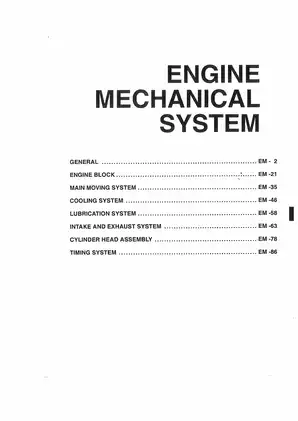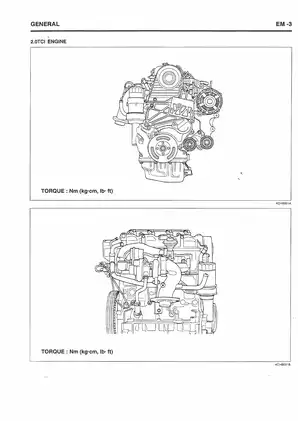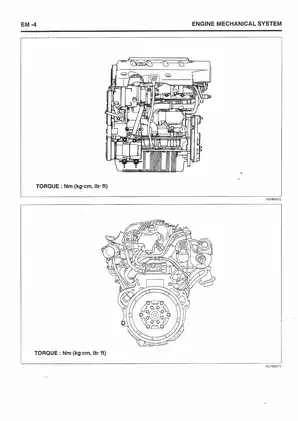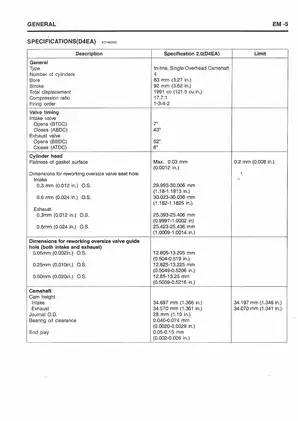Hyundai D4EA Diesel Engine Repair Manual
Includes detailed procedures, diagrams, and specifications for D4EA diesel engines, covering engine block, cooling, lubrication, and fuel systems. Part Number: ECHB0100.
Manual Preview

Sample pages from the Hyundai D4EA Diesel Engine Repair Manual manual




Purchase & Download
Models Covered & Key Technical Specifications
Hyundai D4EA Diesel Engine Manual: Original Factory Service-Catalog Hyundai D4EA Diesel Engine (ECHB0100) - Original Factory Manual for Hyundai D4EA diesel engine Service-Catalog | Series Diesel Engine Suite. Technical Resolution Data: 392.3 kPa establishes the maximum oil pressure for the engine. Essential Power Rating: 1350 bar signifies the maximum fuel pressure for the common rail system. Specific Temperature Range: For optimal operation, 95°C defines the maximum temperature for the coolant. Approved Output Density: 50% determines the maximum coolant concentration for tropical areas. Designated Measurement Bounds: 0.2 mm is the limit for cylinder head flatness. Fundamental Package Size: 65 liter is the specified fuel tank capacity.
Professional Workshop Service Manual & Technical Specifications
Hyundai D4EA Diesel Engine Manual: Original Factory Service-Catalog
Technical-Benchmarks: D4EA / Hyundai Motor Company HMC // Maintenance-Category: Diesel Engine / Engine Mechanical System Logic // Technical-Benchmarks: 2.0L DOHC.
| TOP | Service-Nexus | Rating | Calibration-Standards |
|---|---|---|---|
| Engine Block | 83 mm bore, 92 mm stroke | Max. 0.03 mm (0.0012 in.) cylinder head flatness | |
| Main Moving System | 34.697 mm cam height (intake) | 27 - 30 Nm (270 - 300 kg.cm, 20 - 22 lb.ft) bearing cap torque | |
| Cooling System | 5 liters coolant capacity | 80°C-84°C (176°F-183.2°F) opening temperature | |
| Lubrication System | 5.9 liters oil capacity | 35-45 Nm (350-450 kg.cm, 25-33 lb.ft) oil pan drain plug torque | |
| Intake and Exhaust System | 25-38 Nm exhaust manifold torque | 1.6 mm (0.063 in.) intake valve face thickness | |
| Cylinder Head Assembly | 12 mm cylinder bore, 27Nm + 120° + 90° head bolt torque | 0.2 mm (0.008 in.) limit for cylinder head flatness |
Service sections detail the engine's mechanical systems, including general specifications, engine block, main moving system, cooling system, lubrication, intake and exhaust, cylinder head assembly, and timing system. Additionally, the manual provides extensive troubleshooting guides for various fuel system issues, common rail systems, and electronic diesel control (EDC). It also covers schematic diagrams for different vehicle models (Trajet, Santa Fe, Elantra) related to fuses, relays, and engine control systems, offering a comprehensive resource for diagnostics and repair.
Methodically requiring correct procedures, this manual documents torque specifications for critical engine components to ensure proper pivot-point integrity.
FAQ
Customer Reviews
Read what our customers say about this Hyundai Diesel Engine manual and share your own experience.
Add a Review
This policy contains information about your privacy. By posting, you are declaring that you understand this policy:
- Your name, rating, website address, town, country, state and comment will be publicly displayed if entered.
- Aside from the data entered into these form fields, other stored data about your comment will include:
- Your IP address (not displayed)
- The time/date of your submission (displayed)
- Your email address will not be shared. It is collected for only two reasons:
- Administrative purposes, should a need to contact you arise.
- To inform you of new comments, should you subscribe to receive notifications.
- A cookie may be set on your computer. This is used to remember your inputs. It will expire by itself.
This policy is subject to change at any time and without notice.
These terms and conditions contain rules about posting comments. By submitting a comment, you are declaring that you agree with these rules:
- Although the administrator will attempt to moderate comments, it is impossible for every comment to have been moderated at any given time.
- You acknowledge that all comments express the views and opinions of the original author and not those of the administrator.
- You agree not to post any material which is knowingly false, obscene, hateful, threatening, harassing or invasive of a person's privacy.
- The administrator has the right to edit, move or remove any comment for any reason and without notice.
Failure to comply with these rules may result in being banned from submitting further comments.
These terms and conditions are subject to change at any time and without notice.
Reviews (5)